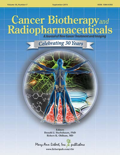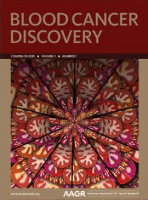
CANCER BIOTHERAPY AND RADIOPHARMACEUTICALS
Scope & Guideline
Empowering oncology with cutting-edge research.
Introduction
Aims and Scopes
- Biotherapy Innovations:
The journal highlights advancements in biotherapy, including immunotherapy, targeted therapy, and novel biomolecules that enhance the efficacy of cancer treatments. - Radiopharmaceutical Development:
Research on the synthesis, evaluation, and clinical application of radiopharmaceuticals for diagnosis and treatment of cancer is a central focus, covering both established and emerging agents. - Tumor Biology and Mechanisms:
Studies exploring the molecular and cellular mechanisms underlying cancer progression, including the roles of non-coding RNAs, signaling pathways, and tumor microenvironment interactions. - Clinical Applications and Trials:
The journal publishes clinical trial data, case studies, and retrospective analyses that provide insights into the effectiveness and safety of various cancer therapies. - Patient-Centric Approaches:
Research that emphasizes personalized medicine, patient stratification, and the integration of novel biomarkers to predict treatment response and improve outcomes.
Trending and Emerging
- Theranostics:
The integration of therapy and diagnostics (theranostics) is increasingly emphasized, with studies focusing on dual-purpose agents that can both diagnose and treat cancer, enhancing personalized treatment strategies. - Non-Coding RNAs in Cancer:
Research on non-coding RNAs, particularly their roles in tumorigenesis, metastasis, and treatment resistance, has surged, highlighting their potential as biomarkers and therapeutic targets. - Radiomics and Imaging Biomarkers:
The use of advanced imaging techniques and radiomics to predict treatment responses and outcomes is gaining traction, indicating a shift towards data-driven, precision oncology. - Immunotherapy Advances:
Innovations in immunotherapy, including novel immune checkpoint inhibitors and CAR-T cell therapies, are increasingly featured, reflecting their growing importance in cancer treatment paradigms. - Personalized Medicine Approaches:
A growing body of research is focusing on personalized medicine strategies, utilizing genetic and molecular profiling to tailor therapies to individual patient needs.
Declining or Waning
- Traditional Chemotherapy:
Research centered on conventional chemotherapy approaches is less prevalent, as the field increasingly shifts towards targeted therapies and immunotherapies that promise better efficacy and reduced side effects. - General Cancer Epidemiology:
Publications focusing broadly on cancer epidemiology without specific interventions or treatment strategies have decreased, reflecting a more targeted approach to research. - Single-Agent Therapies:
There is a noticeable reduction in studies assessing the efficacy of single-agent therapies, as combination therapies and multi-modal approaches gain favor in clinical settings.
Similar Journals

Journal of Bone Oncology
Bridging Science and Practice in Bone Cancer CareJournal of Bone Oncology, published by ELSEVIER, is a pivotal open access journal that has been advancing the field of oncology since its inception in 2012. Focused on the intricate relationship between bone-related malignancies and therapeutic advancements, this journal addresses critical issues in bone oncology, including novel treatments, diagnostic methodologies, and translational research. With a commendable impact factor reflecting its scholarly contributions and ranking in the Q2 category of oncology journals (2023), the Journal of Bone Oncology is recognized within the top 67th percentile across Scopus rankings, showcasing its relevance and quality in the medical oncology landscape. Available in open access, the journal promotes widespread dissemination of knowledge, ensuring that researchers, professionals, and students can access groundbreaking research that informs clinical practices and enhances patient outcomes. Located in Germany and targeting a global audience, the journal’s wealth of resources serves as an essential platform for fostering collaboration and innovation in the oncology community.

Cancer Communications
Pioneering Discoveries in Cancer CommunicationsCancer Communications, published by WILEY, is a leading open-access journal that has positioned itself at the forefront of cancer research and oncology since its inception in 2017. With an impressive HIndex reflective of its scholarly impact and recognized in the Q1 category for both Cancer Research and Oncology as of 2023, this journal consistently ranks in the top echelons of its field, specifically at Rank #16/404 and Rank #13/230 in their respective categories on Scopus. Cancer Communications aims to disseminate cutting-edge research findings, innovative methodologies, and significant advancements in cancer treatments, thereby fostering a deeper understanding of oncology among researchers, healthcare professionals, and students. The journal operates under an Open Access model since 2018, ensuring that vital research is accessible to a global audience, thus enhancing collaboration and knowledge sharing necessary to tackle one of the most pressing health challenges of our time. Located in Hoboken, NJ, United States, and with a strong commitment to scientific excellence, Cancer Communications remains an essential resource for anyone engaged in the fight against cancer.

Molecular & Cellular Oncology
Innovating therapeutic interventions for a brighter future.Molecular & Cellular Oncology, published by Taylor & Francis Inc, is a vital academic journal dedicated to the exploration of cancer biology through the lens of molecular and cellular mechanisms. Since its inception in 2014, the journal has played a crucial role in disseminating innovative research findings that address the fundamental aspects of cancer research and molecular medicine. With its current ranking in Scopus placing it in the Q3 quartile for both Cancer Research and Molecular Medicine, the journal provides a platform for groundbreaking studies that push the boundaries of our understanding of oncogenesis and therapeutic interventions. Although the journal operates under a subscription model, its dedication to high-quality peer-reviewed research makes it an essential resource for researchers, professionals, and students aiming to contribute to or stay updated in the rapidly evolving field of oncology. As we approach the culmination of its converged years in 2024, Molecular & Cellular Oncology aims to continue fostering collaborations and insights that advance cancer research on a global scale.

Molecular Cancer
Pioneering open access to vital cancer insights.Molecular Cancer, published by BMC, stands as a premier open access journal dedicated to advancing our understanding of cancer biology, treatment, and prevention since its inception in 2002. With an impressive Q1 ranking in the domains of Cancer Research, Molecular Medicine, and Oncology, this journal occupies a significant position in the academic landscape, emphasizing high-quality research that influences clinical practices and future studies. The journal is indexed in leading databases with exceptional Scopus ranks, reflecting its rigorous peer-review process and impactful contributions to the field, where it ranks in the top 2-3 positions across various relevant categories. Based in the United Kingdom, Molecular Cancer offers researchers worldwide a valuable platform for disseminating innovative findings that drive the biomedical community forward. The journal's open access model ensures that groundbreaking research is freely accessible, fostering collaboration and knowledge sharing among professionals, students, and academics alike. Explore cutting-edge developments in cancer research through Molecular Cancer and join a community committed to improving patient outcomes and advancing scientific discovery.

Blood Cancer Discovery
Exploring Innovations in Oncology and BeyondBlood Cancer Discovery is a premier academic journal published by the American Association for Cancer Research, dedicated to advancing the understanding of hematologic malignancies through cutting-edge research in the fields of oncology, biochemistry, and molecular biology. With an impressive impact factor and recognition as a Q1 journal across multiple disciplines, including cancer research and hematology, Blood Cancer Discovery serves as an essential platform for scholars and practitioners alike, facilitating impactful discourse and dissemination of pioneering findings. This open-access journal, established within the vibrant academic landscape of the United States, aims to bridge gaps in research and foster collaborations to ultimately enhance patient outcomes. Its Scopus rankings demonstrate its vital role in the critical advancement of cancer research and therapeutic development. By inviting contributions from a diverse range of disciplines, Blood Cancer Discovery is poised to drive innovation and inspire future advancements in understanding blood cancers.

NEOPLASMA
Exploring Innovations in Cancer TreatmentNEOPLASMA is a prominent journal published by AEPRESS SRO, dedicated to the multifaceted field of oncology and cancer research. Since its inception in 1957, this esteemed publication has served as a vital platform for advancing the understanding of neoplastic diseases, disseminating high-quality research findings that contribute to clinical and laboratory advancements. Operating under a robust framework of peer review, NEOPLASMA holds significant credibility, as evidenced by its Q2 ranking in the Medicine (miscellaneous) category and Q3 rankings in both Cancer Research and Oncology for 2023. Furthermore, with an ISSN of 0028-2685 and E-ISSN 1338-4317, the journal fosters accessibility to valuable scientific content despite the absence of open access options. Positioned in Bratislava, Slovakia, NEOPLASMA continues to attract a global readership, making substantial contributions to the fields of biochemistry, genetics, and molecular biology as highlighted by its Scopus rankings. This journal is essential reading for researchers, professionals, and students looking to stay abreast of the latest developments in cancer research and treatment strategies.

Cancers
Connecting researchers for a cancer-free future.Cancers is a leading peer-reviewed journal published by MDPI, dedicated to advancing the field of oncology and cancer research. Established in 2009 and based in Switzerland, this Open Access journal provides a platform for the rapid dissemination of high-quality research findings, reviews, and clinical studies related to all aspects of cancer biology and treatment. With an impressive impact factor and recognized as Q1 in Oncology and Q2 in Cancer Research for 2023, Cancers strives to foster a collaborative environment among researchers, healthcare professionals, and students seeking to deepen their knowledge and understanding of cancer. The journal’s commitment to accessibility and its broad scope make it an invaluable resource for anyone passionate about combating cancer and improving patient outcomes. For more information and to access its diverse publications, visit the journal’s website.

CANCER IMMUNOLOGY IMMUNOTHERAPY
Transforming Insights into Effective Cancer TreatmentsCancer Immunology Immunotherapy, published by Springer, stands as a premier journal in the fields of cancer research and immunology, holding a prestigious Q1 ranking across multiple categories, including Oncology and Medicine as of 2023. With an ISSN of 0340-7004 and an E-ISSN of 1432-0851, this journal has been a pivotal platform for groundbreaking research since its inception in 1976, continuing to provide insight into the complex interactions between the immune system and cancer. The journal's scope encompasses a wide array of topics, including novel therapeutic strategies, immunological mechanisms, and translational science aimed at advancing treatment outcomes for cancer patients. Renowned for its rigorous peer-review process and high impact factor, it attracts contributions from leading experts and researchers around the globe, positioning itself among the top-tier publications with Scopus rankings that reflect its vital role in advancing the field. Access options are generally subscription-based, ensuring a comprehensive resource for professionals and academics seeking to deepen their understanding and make meaningful contributions to cancer immunotherapy.

Oncologie
Transforming cancer treatment through rigorous research.Oncologie is a distinguished academic journal published by WALTER DE GRUYTER GMBH, focusing on the dynamic and vital field of oncology. Established in 1999 and continuously published until 2024, this journal provides a platform for high-quality research and advancements in cancer treatment, prevention, and diagnosis. With an ISSN of 1292-3818 and an E-ISSN of 1765-2839, it is indexed in various databases, contributing to its growing visibility. Although categorized in the Q3 quartile for oncology research as of 2023, Oncologie offers essential insights and fosters scholarly dialogue among researchers, professionals, and students interested in oncology. Its unique contributions aim to bridge the gap between theoretical frameworks and clinical applications, making it a valuable resource for those seeking to advance their knowledge and expertise in cancer research.

JOURNAL OF EXPERIMENTAL & CLINICAL CANCER RESEARCH
Pioneering discoveries that shape the future of oncology.The JOURNAL OF EXPERIMENTAL & CLINICAL CANCER RESEARCH, published by BMC, is a leading open-access journal dedicated to advancing the field of cancer research and oncology. Since its inception in 1982, this esteemed journal has fostered innovation and collaboration in the scientific community, as evidenced by its outstanding impact factor and position in the Q1 quartile for both Cancer Research and Oncology categories in 2023. With a proud commitment to disseminating high-quality research, the journal operates under an open-access model, ensuring that findings are readily accessible to researchers, healthcare professionals, and students worldwide. The journal has established a distinguished reputation, ranking 23rd out of 404 in Medicine oncology and 16th out of 230 in Biochemistry, Genetics, and Molecular Biology (cancer research), showcasing its importance and influence in guiding the future of cancer treatment and research. With the aim of bridging experimental and clinical research, this journal invites submissions that push the boundaries of our understanding of cancer biology and therapy.